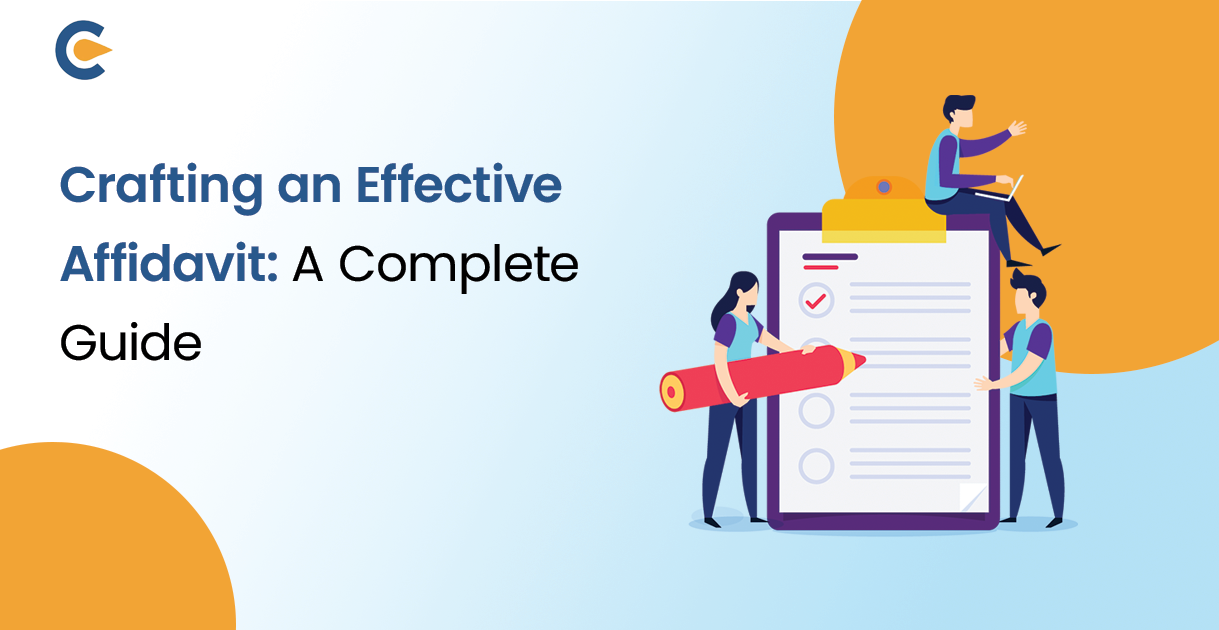An effective affidavit is used in the court to assert any evidence in the proceedings of any ongoing case. It is used for recording statements, submitting evidence, documents, etc. by the advocates on behalf of their clients in the court.
Introduction to Affidavit
An affidavit is a sworn declaration that is essential to judicial proceedings and contains information that the affiant personally knows. Legally speaking, it is not considered as evidence but giving false information through it is against the law. In front of a register clerk or attorney, affiants acknowledge under oath or affirmation that the information they have provided is accurate.
Section 3 of the Indian Evidence Act describes that an affidavit cannot be considered as a piece of evidence in front of the court but can only be considered at the time when the court seems it reasonable to invoke Order XIX of the Civil Procedure Code, 1908.
This solemn pledge ensures that the information supplied is accurate. The affidavit must also be witnessed by a lawyer or other authorized person and contain the affiant’s signature. In legal situations, these procedural stages preserve the document’s validity and dependability by guaranteeing that the court is presented with only relevant and honest information.
Basics of Making an Effective Affidavit
The basics of making an effective affidavit are as follows –
- Facts
To make an effective affidavit the affiant must state only the facts of the case and not his/her opinions on the matter. There should be a clear distinguishment between what was seen or felt by the affiant and what he or she assumes. There is no place for assumptions and interpretations in the court of law.
- Right Order
An effective affidavit includes all the information in chronological order so that there is no confusion and difficulty in understanding the situation. It gives judges clarity on the situation and the events that follow each other thereby saving the court’s valuable time.
Documents in an Effective Affidavit
The documents in an effective affidavit are as follows –
- Exhibit Attachment
Whenever there is a need, the affiant should attach the exhibits in the affidavit to give more clarity on the matter. The exhibits include emails, call logs, photographs, contracts, and other things. These exhibits are used to corroborate the statements and determine if they are based on true events.
- Legible Writing
The affidavit should be written cleanly and clearly if written by hand. This gives clarity in the affidavit and it is easier to decipher its true meaning. Interpretation of such texts can be tricky sometimes thereby leading to confusion and irregular decisions. It is highly advisable to make these types of documents typed since understanding handwriting can be difficult sometimes.
Parties Involved in Creating an Effective Affidavit
The parties that are involved in creating an effective affidavit are as follows –
- Courts/ Tribunals/ Statutory Body – These are the authorities to whom the affidavits are submitted for justifying any statement or an act.
- Affiant – A person making any statement in the affidavit before the court is known as an affiant.
- Oath Commissioner – the oath commissioner is responsible for testifying the signatures of the affiant/ deponent and then marking his/her signatures and a seal to it.
- Witnesses – to prove that the affidavit is authentic, two witnesses are needed to sign it.
Usage of Affidavits
The usage of affidavits is as follows –
- The affidavits are used when there is any need to take an oath in front of the court.
- The affidavits are used to state the relevant facts of any case before the court.
- The affidavits are also used in colleges, schools, and universities for certain declarations by student as well as their parents.
- The affidavits are used for paperwork in many organizations like passports, property matters, etc.
- The affidavits are also used for the cancellation of any documents.
- The affidavits are used for changing the details in any official document like name, date of birth, etc, from documents like PAN card, Aadhar card, passport, and others.
Procedure of Drafting an Effective Affidavit
The procedure for drafting an effective affidavit is as follows –
- Title
There has to be a title of the Affidavit before submitting it to the court. The heading can be the heading of the case or it can be written like ‘Affidavit of PQR’. The heading of the case will include things like the case number, the court in which the matter is listed, and the names of defendants and plaintiffs.
- Identifying Parties
When you start writing an affidavit you must include personal details like name, age, residential address, occupation, and other relevant information for the case. These details are provided to the court to establish yourself as a relevant person related to the case and to establish these facts for future reference.
- Facts
This is the most important section of an affidavit. The facts of the case and establishing the true story of the act are done in this section and it should be in detail covering all the relevant facts. The affiant should not include any opinion while writing the facts as these facts can further be corroborated with other pieces of evidence while making the judgment over the matter. These facts hold importance in matters like Statements of a witness of a murder, rape, Bail Application, Public Interest Litigation, and others, so they need to be stated correctly and should be true.
- Verification
There should be a verification attached to the affidavit stating that the above-stated facts are true to the knowledge of the deponent and for that he/she has to sign on it. It is made to be sure about the facts stated in the affidavit and after that, the deponent would be liable if any statement is written out of the context of the case.
- Notarization
The Oath Commissioner has to notarize the affidavit filed by the deponent after getting the signatures from both the deponent and the witnesses.
- Affiant & Witness’s Sign
After being done with the statement of facts, the affiant is required to sign the affidavit along with the two witnesses. The affidavit has to be signed by the affiant in the presence of the witnesses and then they will have to affirm it by signing the affidavit.
- Exhibits
The deponent should attach the exhibits in the affidavit to give more clarity on the matter. The exhibits include emails, call logs, photographs, contracts, and other things.
Important Aspects to Keep in Mind
Some of the important aspects to keep in mind while drafting an effective affidavit are as follows –
- Format
There is a strict format that should be followed while drafting an affidavit. It should include facts and relevant details in numbered paragraphs and not like the ones that we write generally. Each statement should contain relevant facts and that should just be one or connecting. Different facts should be written in different paragraphs. Apart from this, the affidavit should be neat with enough margin on each side of the page.
- Proofreading
The affidavit prepared should be proofread to claim the authenticity of the document. All the details mentioned in it should be checked twice and necessary corrections should be made if there are any mistakes in it.
- Language
The language of the affidavit should be in first person for a better understanding of the case to the court. It becomes much easier to read and understand the contents of the document. The deponent should mention the facts that he/she knows and should not include any statement/s arising out of hearsay.
Conclusion
To sum up, if you are involved in legal matters, you should understand how to create affidavits. Every step contributes to improving the affidavit’s impact, from understanding its purpose to crafting clear and concise statements. Through adherence to these standards, careful examination, and legal counsel from experts like Corpbiz, people can confidently tackle the complex work of affidavit production. It is imperative to acknowledge that a skilfully composed affidavit can substantiate claims made throughout legal proceedings.
Frequently Asked Questions
Who is an Affiant?
A person making any statement in the affidavit before the court is known as an affiant. It is very important to establish the identity of the affiant like his/her name, address, and other important details.
What is the eligibility to create an Affidavit?
The individuals who are eligible to create an affidavit should have attained the age of majority, do not have an unsound mind, and also a sound minor in the case of family court matter, who is capable of understanding the nature and facts of the case and the documents he/she is signing.
What is the importance of Legible Writing of an Affidavit?
The affidavit should be written cleanly and clearly if written by hand. This gives clarity in the affidavit and it is easier to decipher its true meaning. Interpretation of such texts can be tricky sometimes thereby leading to confusion and irregular decisions.
Is there any difference between a notary and an affidavit?
To establish the signer's identity and guarantee the document's legal validity, a notary public must witness the signing of the document and attach an official seal or stamp. An affidavit, on the other hand, is a signed declaration issued under oath before a notary or commissioner of oaths that contains factual information that the person signing it believes to be accurate.
Can an Affidavit be considered as evidence?
No, as per the section 3 of the Evidence Act of 1872. It can only be considered at the time when the court seems reasonable to invoke Order XIX of the Civil Procedure Code, 1908.
How can an affidavit be made valid in court?
An affidavit is a legal document in the eyes of the law. They can be made by any person to submit in the court or any other institution but these are termed valid only if they are notarized before the submission.
Is it necessary to make affidavits on a stamp paper?
Yes, it is necessary to make affidavits on stamp paper and then get them notarized through the Notary public. Stamp rates might differ depending on the state in which they are made.
Read our article What Is Public Interest Litigation And How Do You File It?











